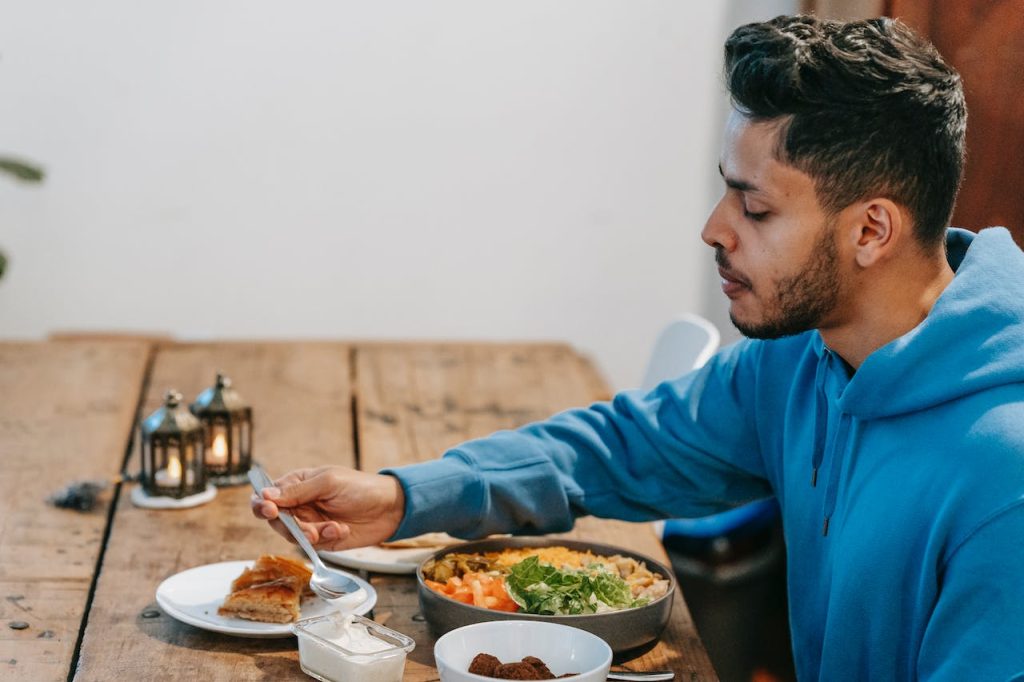Geschatte leestijd: 3 minutenAs we get older, we often start gaining weight without realizing it. Every day, you hear people in the supermarket, at the coffee machine, and at parties complaining about being overweight and unable to shed those pounds.
Speeding Up Your Metabolism
One thing we know for sure is that our metabolism – the process of burning calories – slows down as we age. Metabolism is, simply put, the way our bodies burn the calories from the food we eat.
The shift towards weight gain usually begins for most people in their twenties and thirties. We naturally accumulate body fat as we lose muscle mass. This loss of muscle mass can significantly affect your metabolism.
From around your mid-twenties, your metabolism starts to decrease by about five percent every ten years! So, it seems like we’re starting a battle between aging and metabolism. We can’t control aging, so what now? Do we wave the white flag and accept what seems like a natural progression of unwanted and constant weight gain?
Absolutely not! There are several simple and natural ways to win this battle, no matter how old you are.
Increase Your Muscle Mass
The most important component of your metabolism is your lean muscle mass. Muscle burns up to 90% more calories than fat. The more muscle mass you have, the more calories you’ll burn throughout the day. By gaining an extra 1.3 to 2.25 kilograms of muscle mass, you can burn an extra 110 to 250 calories per day. If you’re already eating more than you burn, use this as fuel for training to grow your muscle mass.
Don’t Skip Meals
The idea that you reduce your calorie intake by skipping meals is somewhat more complex. When people skip meals or drastically reduce their calorie intake, it can slow down their metabolism. The body adapts to the lack of calories as if there were a famine. The burning rate can decrease by 10 to 15%, and the body will continue to retain fat tissue and burn lean muscle mass. Moreover, you’ll end up eating more at the next meal because you’ve starved yourself. You’ll then consume more, which will be converted into fat more slowly.
Eat at least three meals a day and avoid consuming fewer than 1000 calories.
Regular Activity
Regular exercise like cycling, walking, or climbing helps increase your metabolism during the activity and for hours afterward. Even simple movements like taking the stairs, cleaning the house, or gardening can help boost your metabolism.
Adequate Protein Intake
Proteins are the building blocks for your muscles. Without enough protein, you can lose muscle mass. You need at least 0.5 to 0.6 grams of protein per pound of body weight. For a woman weighing sixty kilograms – 120 pounds – this translates to 60 to 72 grams of protein per day. For active athletes, this is much higher. Use our nutrition calculator to calculate your needs.
Adequate Sleep
A study at the University of Chicago in 1999 showed that insufficient sleep affects the way we burn carbohydrates, which can lead to glucose intolerance and probably more hunger and a slowed metabolism.
Lack of sleep can also affect your energy levels throughout the day and cause you to skip your workout because you’re ‘too tired.’ How many times have you told yourself that?
Less Alcohol
Alcohol suppresses your body’s ability to burn fat. Research has shown that when you drink alcohol during a meal, your body burns fat slower than normal during the same meal. So watch your alcohol consumption.
Don’t Believe in Magic Solutions
We’ve all seen the advertisements for products that are supposed to increase our metabolism and promise significant weight loss. Metabolism boosters and fat burners, the people in the commercials not only show that they lose a lot of weight but also that they get a tighter body and a six-pack. Can a pill do all that? No. Only a few products have been shown in various studies to contribute to fat burning.
You can read more about this in the article “Fat Burners That Really Work.”
Eat a balanced diet that doesn’t exceed your calorie needs, exercise regularly, and sleep well. Realize that you may not look like you did at twenty, but you can certainly look as good as possible with more energy and good health at any age.

